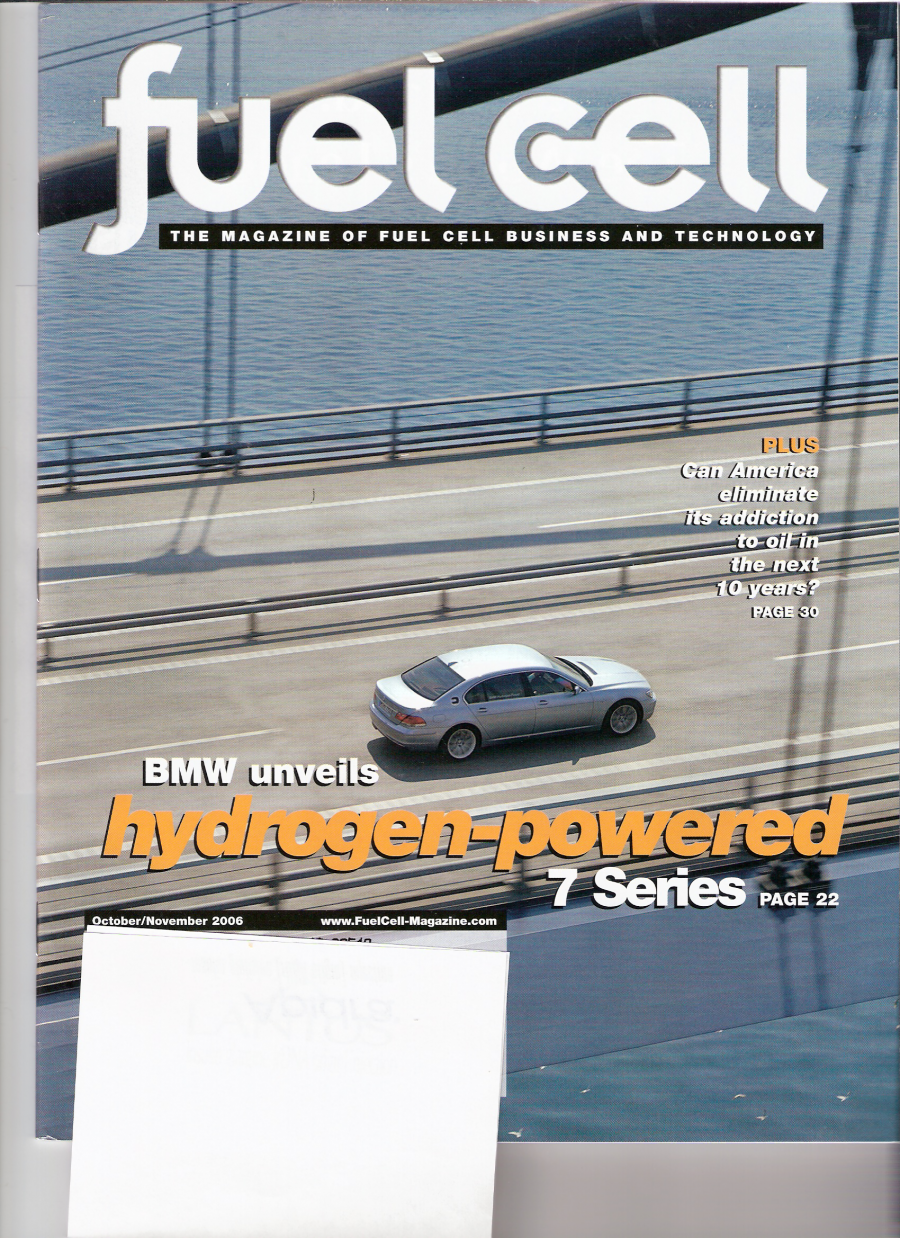
Hydrogen fuel cell car is here
#21

Posted 16 June 2008 - 10:20 PM
#22

Posted 16 June 2008 - 11:05 PM
It's like a battery: you put energy in, you get energy out, and it's zero sum game.
A battery with 100% charging efficiency (not to mention other losses in charger, etc.) is a remarkable thingy.
#23

Posted 16 June 2008 - 11:10 PM
Water vapor is a naturally occurring greenhouse gas and accounts for the largest percentage of the greenhouse effect, between 36% and 66%, some claim upper 90% of the greenhouse effect.
Edited by Rogerdodger, 16 June 2008 - 11:14 PM.
BIGGEST SCIENCE SCANDAL EVER...Official records systematically 'adjusted'.
#24

Posted 17 June 2008 - 12:20 AM
> 4) Hydrogen is quite simply the most abundant element in the universe. Capturing, using it, storing it, or
> producing it from other energy source is the challenge. In a fuel cell it is simply a "carrier" of energy. But
> H2 is energy itself. what the heck do you all think the sun is made of ? farts ?
NO NO NO. It is NOT energy. Hydrogen-ready-to-burn does not exist in our realm! It is stored in other molecules that have to be taken apart --- with energy -- in order to produce hydrogen that can then be burned -- releasing the same amount of energy used to produce it (roughly).
It's like pushing on a spring to then get energy out of the spring: the energy to compress the spring equals the energy released by the spring. It's a zero sum game. Energy in equals energy out -- just like a battery.
Now, if hydrogen were lying about, waiting to be mined like oil or coal, then that would be different. Then it WOULD be a source. But, H2 doesn't just lie around waiting to be harvested. You have to break it out of other molecules, and the energy required to break it out and reduce it to H2 is then equal to the energy you then get from it when you burn it.
It's like saying "gravity" is a source of energy because stuff falls down hill, while completely forgetting you have to first push stuff uphill to get the downhill
energy released. It's a zero sum game.
Yes, well said. There is a great difference between the hydrogen of the stars (PLASMA - no electrons) which is used in a NUCLEAR fusion reaction of the sun to produce essentially all existing energy sources indirectly, except maybe fission? Solar became fossil fuel eons ago, for example. The hydrogen used for fuel only exists as diatomic molecules (H2). Essentially all hydrogen on the earth exists as mono atomic hydrogen with oxidation number of +1 combined with other elements, and is 9th in abundance making up about 1% of earth's crust.
Hydrogen's appeal is it is portable -- you can store energy in it and they tote it around (and it's lightweight, lighter than chemical batteries).
Tanks, valves, regulators, pumps are required which can be bulky and more finicky than energy stored in batteries. The best lightweight tanks do give a weight advantage to hydrogen but at greater expense. Producing H2 is not particularly efficient when the overall cycle is considered. Losses in electrical conversion to chemical (O2 energy lost, interphase losses, etc), storage losses, etc. Even the water gas method using coke produces byproducts which drain off energy efficiency and byproducts (carbon monoxide) might need to be removed or cause disposal issues in some applications.
Hope this helps.
Out
It's abundance is completely irrelevant. You don't *use* it like you use coal or oil. You take, say, water apart to get hydrogen and oxygen (using energy) and then you capture the hydrogen. Then you burn (oxidize) the hydrogen and get water (and energy), putting the hydrogen right back where it started. The energy you get out is equal to the energy you put in. You don't consume the hydrogen or the oxygen (so their abundance is irrelevant). It's like a battery: you put energy in, you get energy out, and it's zero sum game.
#25

Posted 17 June 2008 - 12:26 AM
It's like a battery: you put energy in, you get energy out, and it's zero sum game.
A battery with 100% charging efficiency (not to mention other losses in charger, etc.) is a remarkable thingy.
So you understand that hydrogen is not a fuel, but rather a storage thingy?
(And yes there are losses in any charge/discharge process, so 100% is never on the table.)
The point I'm making -- and nimblebear doesn't understand -- is that hydrogen is not laying around waiting to be harvested (like oil and coal). You gotta make it, and making it takes more energy than you get out of it.
For example, take 1000 BTUs of energy (from some real source like coal or solar or nukes) and apply it to water. By doing so you can separate hydrogen from oxygen and harvest the hydrogen.
Now, burn the hydrogen (ie, re-oxidize it). How many BTUs do you get? Less than 1000. It's impossible to break even.
If you want 1000 BTUs from hydrogen, you gotta use MORE than 1000 BTUs (and that's gotta come from somewhere else, like from coal, nukes, etc.
Hydrogen is not a fuel, it's a less than 100% efficient storage thingy.
#26

Posted 17 June 2008 - 07:41 AM
It's like a battery: you put energy in, you get energy out, and it's zero sum game.
A battery with 100% charging efficiency (not to mention other losses in charger, etc.) is a remarkable thingy.
So you understand that hydrogen is not a fuel, but rather a storage thingy?
(And yes there are losses in any charge/discharge process, so 100% is never on the table.)
Yes I know. I was only noting that the "zero sum" thought was off the mark and was not addressing the nature of hydrogen vis-a-vis coal, nuclear, etc. The way to make the case in no uncertain terms is to do an energy balance around the whole process from beginning to end, including production of the intial fuel through end usage. That's the bottom line which, of course, is only a snapshot as it could be significantly affected by new technologies for producing H2 (e.g., Japanese-Australian solar approach, thermoelectric generators, etc.). Such analyses have been done (Google away) and there ain't no free lunch.
#27

Posted 17 June 2008 - 07:54 AM
It's like a battery: you put energy in, you get energy out, and it's zero sum game.
A battery with 100% charging efficiency (not to mention other losses in charger, etc.) is a remarkable thingy.
So you understand that hydrogen is not a fuel, but rather a storage thingy?
(And yes there are losses in any charge/discharge process, so 100% is never on the table.)
The point I'm making -- and nimblebear doesn't understand -- is that hydrogen is not laying around waiting to be harvested (like oil and coal). You gotta make it, and making it takes more energy than you get out of it.
For example, take 1000 BTUs of energy (from some real source like coal or solar or nukes) and apply it to water. By doing so you can separate hydrogen from oxygen and harvest the hydrogen.
Now, burn the hydrogen (ie, re-oxidize it). How many BTUs do you get? Less than 1000. It's impossible to break even.
If you want 1000 BTUs from hydrogen, you gotta use MORE than 1000 BTUs (and that's gotta come from somewhere else, like from coal, nukes, etc.
Hydrogen is not a fuel, it's a less than 100% efficient storage thingy.
I fully understand what H2 is and how we will use it.
Its abundance IS TOTALLLY relevant. Efficiency only matters in the cost of the technology or stuff needed to get it, and the size. You can get H2 from a multitude of sources. That is the point. H2 is about storage, being a carrier, about abundance, about its natural occurance, and about its use as a fuel. And you can use it without COMBUSTING it, which it appears YOU don't understand, or appreciate what that means.
If you want to debate me on the use of H2, or fuel cells, be my guest. I worked for a fuel cell developer, and a company who funded the development of fuel cells since the '70's.
P.S. where doo you get the "oxidization' or 'burning' garbola ? Did you just make that up, or did you read it somewhere from the "reliable" info on the internet ?
#28

Posted 17 June 2008 - 08:08 AM
It's like a battery: you put energy in, you get energy out, and it's zero sum game.
A battery with 100% charging efficiency (not to mention other losses in charger, etc.) is a remarkable thingy.
So you understand that hydrogen is not a fuel, but rather a storage thingy?
(And yes there are losses in any charge/discharge process, so 100% is never on the table.)
The point I'm making -- and nimblebear doesn't understand -- is that hydrogen is not laying around waiting to be harvested (like oil and coal). You gotta make it, and making it takes more energy than you get out of it.
For example, take 1000 BTUs of energy (from some real source like coal or solar or nukes) and apply it to water. By doing so you can separate hydrogen from oxygen and harvest the hydrogen.
Now, burn the hydrogen (ie, re-oxidize it). How many BTUs do you get? Less than 1000. It's impossible to break even.
If you want 1000 BTUs from hydrogen, you gotta use MORE than 1000 BTUs (and that's gotta come from somewhere else, like from coal, nukes, etc.
Hydrogen is not a fuel, it's a less than 100% efficient storage thingy.
U might wanna educate yourself - here is a mag. fur u .... knocka yourself out...
#29

Posted 17 June 2008 - 08:21 AM
#30

Posted 17 June 2008 - 08:35 AM
It's like a battery: you put energy in, you get energy out, and it's zero sum game.
A battery with 100% charging efficiency (not to mention other losses in charger, etc.) is a remarkable thingy.
So you understand that hydrogen is not a fuel, but rather a storage thingy?
(And yes there are losses in any charge/discharge process, so 100% is never on the table.)
The point I'm making -- and nimblebear doesn't understand -- is that hydrogen is not laying around waiting to be harvested (like oil and coal). You gotta make it, and making it takes more energy than you get out of it.
For example, take 1000 BTUs of energy (from some real source like coal or solar or nukes) and apply it to water. By doing so you can separate hydrogen from oxygen and harvest the hydrogen.
Now, burn the hydrogen (ie, re-oxidize it). How many BTUs do you get? Less than 1000. It's impossible to break even.
If you want 1000 BTUs from hydrogen, you gotta use MORE than 1000 BTUs (and that's gotta come from somewhere else, like from coal, nukes, etc.
Hydrogen is not a fuel, it's a less than 100% efficient storage thingy.
I fully understand what H2 is and how we will use it.
Its abundance IS TOTALLLY relevant. Efficiency only matters in the cost of the technology or stuff needed to get it, and the size. You can get H2 from a multitude of sources. That is the point. H2 is about storage, being a carrier, about abundance, about its natural occurance, and about its use as a fuel. And you can use it without COMBUSTING it, which it appears YOU don't understand, or appreciate what that means.
If you want to debate me on the use of H2, or fuel cells, be my guest. I worked for a fuel cell developer, and a company who funded the development of fuel cells since the '70's.
P.S. where doo you get the "oxidization' or 'burning' garbola ? Did you just make that up, or did you read it somewhere from the "reliable" info on the internet ?
P.S. I'll give you 50% correct. There is a oxidation half reaction. And there is a reduction half reaction. This gives you a cell reaction. 2H2 +O2 ---> 2H2O. You can't have one reaction without the other. Oxidation half reaction: It is a process where a chemical species changes to another species with a more positive charge due to the release of one or more electrons.
PPS A fuel cell is 2 to 3 times more efficient than an internal combustion engine.
PPPS. A battery is also an energy conversion device. Both battery's and fuel cells are are electrochemical conversion devices.
There is NO COMBUSTION (or 'burning') involved in either fuel cells or batteries.
Fuel cells advantages over batteries are:
smaller size
lighter weight
quick refueling (vs. re-charging)
longer range















